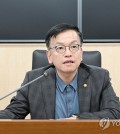- California Assembly OKs highest minimum wage in nation
- S. Korea unveils first graphic cigarette warnings
- US joins with South Korea, Japan in bid to deter North Korea
- LPGA golfer Chun In-gee finally back in action
- S. Korea won’t be top seed in final World Cup qualification round
- US men’s soccer misses 2nd straight Olympics
- US back on track in qualifying with 4-0 win over Guatemala
- High-intensity workout injuries spawn cottage industry
- CDC expands range of Zika mosquitoes into parts of Northeast
- Who knew? ‘The Walking Dead’ is helping families connect
N. Korean workers abroad only get to keep 10% of their earnings
Book depicts harsh conditions for NK workers abroad

North Korean workers have a rest at a railway construction site in Russia’s Far East city of Vladivostok. (Korea Times file)
By Kim Se-jeong
North Koreans working abroad earn $1,000 per month on average, but up to 90 percent of their wages is intercepted by authorities, according to a book about human rights on their experiences, released Tuesday.
The Database Center for North Korean Human Rights (NKDB), a private research institute, authored the book after interviewing 20 North Koreans with experience of working abroad. They worked in nine countries, including Russia, China, Kuwait, Malaysia, Qatar, Singapore and the United Arab Emirates. Their names were not disclosed. Most interviewees said their wages were paid in the local currency.
“I was happy with $100 at first,” said one who worked in an Eastern European country said. “But, later I learned the amount was only 10 percent of what I was supposed to be given, which bothered me. Even that, I was not given entirely. They took money for food, transport and sometimes saying the country needed my help.”
The exact number of North Korean workers abroad is unclear. Researchers said between 50,000 and 60,000 are working in 40 different countries and they send back between $1.2 million and $2.3 million per year.
Russia receives almost 20,000 workers, followed by China with 19,000. Kuwait, UAE, Mongolia, Qatar and Angola also have sizeable numbers. Poland has approximately 500 workers, the only European country to allow North Koreans to work in its country.
Workers are sent through a North Korean service agency, which collects wages from the employers each month.
North Korea has sent workers abroad since 1940s. The former Soviet Union was the first country to receive them. Most were loggers and trees were shipped back to the North to build buildings. That trend changed as North Korea’s foreign reserves dried up. Now the regime mainly uses the workers to earn foreign cash.
The book said most workers are sent to construction sites or forests. Some positions require special skills, such as medicine, art and IT and those with these skills are relatively better off.
The interviewees depicted harsh working conditions in the book.
“The work began at 8 a.m. Lunch was at noon, and I went back to work. Evening work began after dinner at 5 p.m. When I went home early, it was 1 or 2 a.m. I slept four or five hours before going back out again,” one who worked in Russia in 1995 testified.
Another said, “The only day off was New Year’s day. You would not get the day off if your job was as a driver though.”
Another former worker in Russia said, “In minus 30 or 40 degrees Celsius, I was only given one thin uniform. The thick ones that the Russians were wearing were available, but I had to purchase them myself.”
Despite the harsh conditions, being able to work abroad is a privilege, the book said. Competition is fierce among North Koreans to win the chance to work abroad for three to five years. Two important criteria are loyalty to the regime and marital status.
The majority of workers are male in their 40s with families. They are not allowed to travel with their family. Female workers are much rarer, but those who take part are usually in their 20s and work in North Korean restaurants in China.
Former workers said the treatment was poor for those who got injured or died at work.
The workers had small clinics in their residential compound, which could treat simple illnesses. Neighborhood hospitals were available for those with severe illnesses but the workers had to cover the cost. When an illness was too grave to carry on the work, the workers were sent back home.
“Last year, my colleague died. It was not his fault,” said one defector, who worked in Kuwait in 2010. “He fell from a crane. I heard Kuwait had compensation for him, but his family only received $2,000. That’s when I thought I had no hope in this country.”
The NKDB director Yoon Yeo-sang called on the countries that host North Korean workers to tighten monitoring on human rights violations of those workers or to stop receiving them as means to put pressure on North Korea.
“What happens in these work places is a replica of conditions in North Korea.”












Pingback: Korean Restaurant In Kuwait City | Top Restaurant info: Best Thai restaurants
Pingback: Korean Restaurant In Kuwait City | Local Restaurants
Pingback: Korean Restaurant In Kuwait City | Restaurant Guide
Pingback: Korean Restaurant In Kuwait City | Thailands best restaurants
Pingback: Singapore Private Driving Centre | virtual - hazardperceptiontest
Pingback: Korean Restaurant In Kuwait City | I'm Hungry - Give me Food